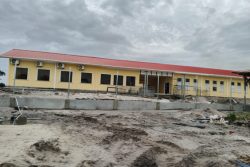In what they described as a special statement, Heads of State of Caricom and Cuba today condemned the application of a US law which prevented the Hilton Hotel in Trinidad from hosting a conference at which Cuban President Raul Castro was to be present.
A statement issued by the Caricom Secretariat said “We the Heads of State and Government of CARICOM and Cuba gathered for the Fourth CARICOM-Cuba Summit in Port-of-Spain, Trinidad and Tobago are affronted by the intrusion of the United States against the sovereignty of Trinidad and Tobago. This is a unilateral and unwarranted extra-territorial application of the United States Helms Burton Law which is contrary to the United Nations Charter and to international law. It also flies in the face of the annual overwhelming rejection of this policy by the United Nations General Assembly.
“We reject the intervention of the US authorities which prevented the hosting of the CARICOM-Cuba Summit at the Hilton Hotel. This was one more demonstration of the injustice of the United States embargo and its harmful impact on the daily life of the Cuban people. On this occasion the extra-territorial action could have impacted on the success of the Summit, but thanks to the commitment and solidarity of the Member States of the Caribbean Community we can celebrate an outcome which reinforces the strong fraternal bonds between CARICOM and Cuba.”
The summit opened on yesterday at the National Academy for the Performing Arts (NAPA), Port of Spain.
On Tuesday, Hilton Trinidad general manager Ali Khan read to the Trinidad Express a statement from Hilton Worldwide, which stated that the US-based company was subject to restrictions regarding the trade embargo between the US and Cuba, and provision of services to Cuba without a special licence could result in “significant civil and criminal penalties”.
The legislation in question is the Helms-Burton Act, signed in 1996 by then US President Bill Clinton, which placed further restrictions upon US citizens and companies doing business with or in Cuba.
Hilton Worldwide, according to the Express, stated that though working with appropriate governmental agencies in the US and Trinidad and Tobago, the US Government informed them that the licence would not be granted for the summit.
Embassy acting public affairs officer Alexander McLaren, however, told the Express on Thursday via e-mail and telephone interview that, to his understanding, the licence is pending and the only reason the Hilton did not get it is because they had not applied on time.
He reported that the Hilton application for a licence to host Cuban nationals was dated November 23 and the Office of Foreign Assets Control—a department of the US Treasury—received the application on November 28. He said the hosting of Cuban nationals at the summit was a complex issue that was being examined and “which will likely take time to resolve”.
Foreign Affairs Minister Suruj Rambachan, speaking on the issue following the arrival of Castro at the old airport terminal in Piarco, said, “The US, I suppose, are within their rights to carry out what they have done in terms of the Helms-Burton law, having their tentacles stretching out here in Trinidad and Tobago as well as the Caribbean.”
He noted that they had the alternative arrangement with NAPA in place and the Hyatt Regency, Marriott and Crowne Plaza also could not have been used due to the same restriction. “And I think eventually we will have to see in a wider global sense and as part of the community of the Caribbean that you cannot keep a policy of exclusion for too long,” he added.
On Wednesday night on CNC3 television, Prime Minister Kamla Persad-Bissessar said she will not get involved in United States foreign policy.
Persad-Bissessar made the statement when questioned at the airport about the Hilton Trinidad’s decision to deny permission for the hosting of the conference.
“They seem to have some kind of regulation. On our enquiries, I am advised that they have some kind of regulation which prevents any US-owned asset or partly-owned asset from accommodating Cubans. It is clearly a foreign policy of the US and I will not comment on their foreign policy. They are a sovereign nation and they are entitled to govern as they see fit,” Persad-Bissessar said.
Meanwhile, newly elected Guyanese President Donald Ramotar is lobbying for the inclusion of Cuba in hemispheric affairs.
According to the Government Information Agency, Ramotar sent a message to the two-day meeting in Trinidad which was read by Foreign Affairs Minister Carolyn Rodrigues.
In his statement Ramotar again called for the lifting of the US embargo against Cuba. He said the summit will provide the opportunity to review the existing programme of cooperation between CARICOM and Cuba and acknowledged the proposals made by Cuba that can give added impetus to the two countries’ relations.
“This gesture is a further demonstration of Cuba’s continued commitment to assist – through both bilateral and regional programmes – the economic and social development of our countries, despite the several challenges facing the Cuban people. My Government is especially grateful to the Government and people of Cuba for the selfless and valuable contribution to the development of our country and to the welfare of its people,” President Ramotar said.








